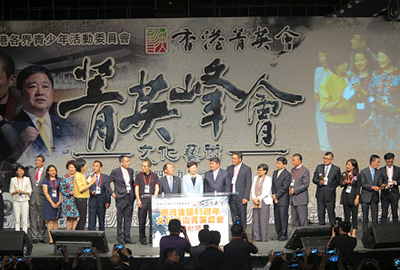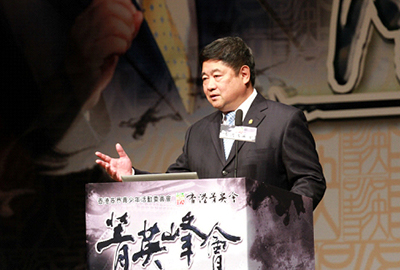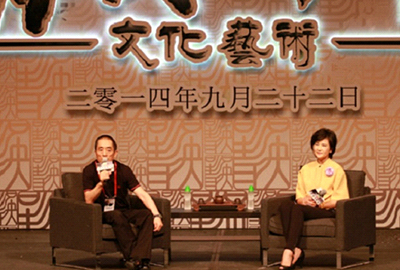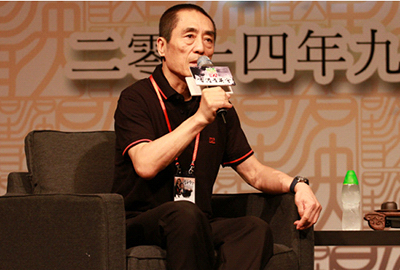|
22 September, 2014
“Leading Lights of Chinese Culture Share Their Experiences at the Y. Elites Summit in Hong Kong
The mere mention of the Forbidden Palace always evokes China’s architectural splendour and fabled past. As the symbol of the nation’s cultural legacy, its mysterious grandeur and cultural riches have long captured the world’s imagination. As the new Director of The Palace Museum, Mr. Shan Jixiang is preparing for the 600th birthday of the Forbidden Palace with confidence and anticipation. Equally deserving of attention is the country’s film industry. With China’s movie market becoming increasingly mature, more and more directors are engaged in telling uniquely Chinese stories through their lenses. One such auteur is Zhang Yimou, a titan of contemporary Chinese cinema.
In the afternoon of September 23, 2014, the Cultural and Artistic Elites Summit, organized by the Y. Elites Association and the Hong Kong Youth Activities Committee, was held at the Queen Elizabeth Stadium. What happens when Chinese culture meets the art of filmmaking? Speaking from their own experiences, Mr. Shang and Mr. Zhang recounted their personal odysseys in promoting traditional Chinese culture. Their recollections provided a truly inspiring cultural feast for the audience.

The opening ceremony of the Cultural and Artistic Elites Summit marking the 65th National Day.
“Shang Jixiang “Passing the magnificent Forbidden City on to the next 600 years”
In his 2-hour themed exposition, Mr. Shan weaved together a colorful tapestry of palace lore and anecdotes from 3 different narrative strands: ancient architecture, historical relics and visitor experience. His absorbing account was received with frequent laughter and applause from the audience.

Mr. Shan Jixiang speaking at the summit.
“Youth Power • The Road To Here – Ms. Sally Wu meets Zhang Yimou
““I may not be smart, but I work hard”
When host Ms. Sally Wu asked Zhang whether he’d ever felt lost, the filmmaker said he had felt that way when he was working in the village. He emphasized that he was not the naturally gifted type, but he understood that hard work is more important than talent. Success is something you have to work for. He was a photography buff. To teach himself to take good pictures, he spent a year and a half saving up ¥186.6 to buy his first Seagull camera. He said that through the sweat of our brows, we can change our destiny. No pain, no gain. Hard work is a crucible from which one’s values and ideals are born.

Ms. Sally Wu speaking with Zhang Yimou.
“If I could, I would choose to live in the Red Sorghum era
When the conversation turned to Red Sorghum, a twinkle appeared in Zhang’s eye. Red Sorghum is his breakout film. It was also his starting point. He said that the film is set in an era characterized by freedom, passion and willful spontaneity. If he could choose to live in any era, he would choose those care-free days, when dreams were embraced and pursued with youthful courage and vitality.

Zhang Yimou talking about his long road to success
“Setting a new course with the help of Hollywood
Talking about Hollywood’s impact on China’s and the world’s movie markets, Zhang said that, in his opinion, instead of being xenophobic about Hollywood’s cultural influence, we would be better off leveraging its strengths. He sees an opportunity to use Tinseltown’s halo to reflect the lustre of Chinese heritage, and he intends to take advantage of this opportunity to entrench the timeless appeal of Chinese culture in world cinema.
Since its establishment in 2007, the Y. Elites Association has organized a number of meaningful and culturally significant forums and activities. This year’s Cultural and Artistic Elites Summit was held as part of the National Day celebrations, and through open conversations with well-known cultural figures, aimed to help give young people a creative spark and enrich their imagination. Long committed to the promotion and propagation of Chinese culture, Dim Sum TV was a key supporter of the event.
|

